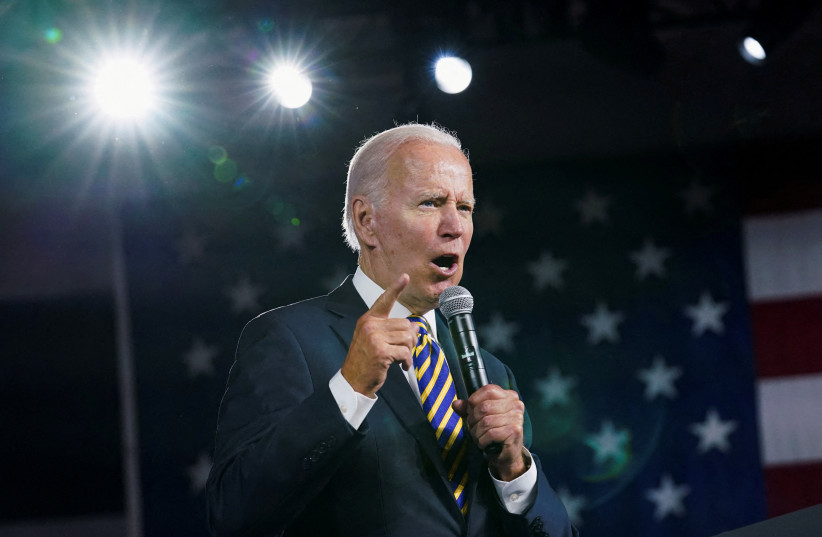The Jerusalem Declaration of the US-Israel Strategic Partnership will be a centerpiece of US President Joe Biden’s visit to Israel on Wednesday through Friday.
The agreement includes a joint stance against Iran’s nuclear program and regional aggression, with both countries saying they will use “all elements of national power” to ensure Iran never attains a nuclear weapon.
In addition, President Biden will reaffirm his commitment to Israel’s security, including its qualitative military edge and ability to defend itself by itself.
Helping Israel defend itself
The declaration states the US plans to follow up on the 10-year $38 billion Memorandum of Understanding on military aid signed with Israel, addressing emerging threats and new developments in the region.

Iran is at the top of Israel’s agenda for bilateral meetings with the Americans at all levels, including Prime Minister Yair Lapid’s meeting with Biden, a senior Israeli official said.
“Iran is continuing to violate its obligations and continues to deceive the international community,” the official said.
“Things published in recent weeks – and even just yesterday – statements by our American counterparts, reflected that,” referring to a remark by US National Security Adviser Jake Sullivan that Iran plans to provide Russia with hundreds of drones.
“Iran is continuing to violate its obligations and continues to deceive the international community"
Israeli official
When it comes to indirect negotiations between Iran and the US on the latter’s nuclear program, “Iran is playing for time,” the official added. “As long as Iran believes time is on its side, it will not give in or make any concessions. Time has run out [on the 2015 Iran deal], and it is crucial to exert pressure on Iran.”
Collaboration with the Biden administration on the Iran front is “very strong,” and Israel is grateful for it, the official stated, expressing hope that work on a joint strategy will be taken “to the next level” during Biden’s visit.
Why issue the Jerusalem Declaration?
The Jerusalem Declaration will be “a living testimony to the unique quality, depth and scope of the US-Israel relationship,” an Israeli diplomatic source said on Tuesday. “It expresses the warmth and profound commitment to the relationship on both sides, specifically [the US commitment] to Israel’s security, prosperity and wellbeing.”
The full text of the declaration was not released to the public.
The document also recognizes the “regional architecture” of cooperation between Israel and Arab states in recent months with US involvement.
“It is basically saying the US is very much committed to working with Israel and our partners and friends to try to transform the region,” the source said.
Where is Saudia Arabia in all of this?
Biden is expected to announce an agreement between Saudi Arabia and Israel that would allow the former to regain control of two islands in the Straits of Tiran, with Israel agreeing to change security arrangements stipulated in its peace treaty with Egypt that included an international military force on those islands.
The security arrangements for Israel will be moved onto what will remain Egyptian land. Saudi Arabia is expected to allow Israeli commercial flights in its airspace, as well as limited direct flights from Israel for Muslims making the pilgrimage to Mecca.
The president plans to fly directly from Israel to Saudi Arabia, which “encapsulates a lot of the dynamics evolving over the last months,” the Israeli official said. “In a few days it will be out in the open. We hope the steps taken now are only the beginning, and will be the start of a process of normalization between the countries.”
In addition, Jerusalem praised the rapprochement between Washington and Riyadh signified by Biden’s visit.
Israel also hopes to accelerate efforts to participate in the US visa waiver program during Biden’s visit, though progress on that front faced domestic political obstacles in Israel.
Biden is expected to arrive in Israel on Wednesday afternoon for his 10th visit to the country, his first as president.
The visit will begin with a Defense Ministry presentation at Ben-Gurion Airport, in which Defense Minister Benny Gantz, IDF Chief of Staff Aviv Kohavi and others will brief the president and display a “multi-tiered air defense array” including the Iron Dome and the Iron Beam laser-based missile defense system, still in development.
After that, Biden will meet with two American-Israeli Holocaust survivors at Yad Vashem.
The next day, the president will hold a lengthy meeting with Lapid, followed by a news conference.
President Isaac Herzog will then hold a reception for Biden, at which he will present the US president with a medal of honor. Cabinet ministers will be in attendance at the President’s Residence.
Biden will go to the Maccabiah Games with Lapid.
He is not scheduled to have dinner with Lapid on either day of his trip, which is unusual for presidential visits.
Biden plans to meet with Palestinian Authority President Mahmoud Abbas in Bethlehem on Friday, as well as to visit Augusta Victoria, a Palestinian hospital in east Jerusalem, where he will announce that the US is restoring aid to Palestinian hospitals in the city.
The Biden administration declined to allow Israeli officials to accompany the president in eastern Jerusalem, signaling that they do not recognize that part of the city as Israeli.
Rep. Beth Van Duyne (R-TX) began to circulate a petition calling on Biden to cancel the hospital visit, writing that it would “reward the Palestinian Authority, which continues to support terrorist activities, terrorist attacks, and violence against Israeli citizens on the Temple Mount. The Jerusalem Embassy Act of 1995, which you supported as a senator, affirms the United States’ policy of preserving Jerusalem as a united city while upholding freedom of religion and equal rights for all religious and ethnic groups.”
